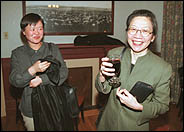From a side-room of her own
| Almost one hundred years ago, Virginia Woolf wrote of the necessity of "a room of one's own." She meant the space a woman could claim for herself, exclusively. It signified a refuge from the busy, cluttered household, its myriad demands on womanly energy, and its imposition on female autonomy. In a separate room, a woman could find the bliss of solitude necessary for artistic pursuits.
 East Asian Studies professor Grace Fong with PhD student Sufeng Xu in background.
East Asian Studies professor Grace Fong with PhD student Sufeng Xu in background.
PHOTO: OWEN EGAN | |
In China, one to two centuries before Woolf wrote, a woman's private space also possessed great symbolic and creative meaning though for some Chinese women a room of one's own was out of the question; a side room was all that could be hoped for, according to Professor Grace Fong of East Asian Studies.
Speaking recently on "Writing from a Side Room of Her Own: The Literary Vocation of Concubines in Ming-Qing China (17-19C)," Fong explored the surprisingly rich creative legacy left by China's concubine poets. During this third lecture in the series, Renaissance of Chinese Poetry (endowed by former East Asian Studies professor, Paul Hsiang); she described to the packed audience the socially marginal position held by concubines.
"That marginality was physically manifest in the location of their living quarters. The side room reserved for the concubine was a consequence of a gendering and hierarchizing of space." Different parts of the household were accorded significance, and then designated in order of importance: the best part for the altar used for ancestor worship; the next for the husband; the next for the principal wife, and so on. The concubines were virtually exiled to the periphery: a side room, a back room, or even a separate villa if the wife so wished. In fact, the Mandarin word for concubine, "ceshi," also means "side room."
These concubines were often treated as chattel, used by the husband for pleasure, of course, but also for the production of additional children (who then officially belonged to the wife, never the birth mother). In their mid-teens, the concubines were often brokered from their families, whom they never saw again. They were effectively "cut off from the outside world" and could "be renamed at will and disposed of at will" by the husband.
Yet, the side room afforded concubines a kind of sanctuary if the circumstances of the family permitted them the leisure and freedom to engage in personal pursuits. Many wrote poetry and some were fortunate enough to have it published. It is through these poems — retrieved by Fong over years of scouring the archives in China — that we are now permitted a glimpse of the true conditions and "self-perceptions" of these women.
The poems, translated and distributed amongst the audience by Fong, are lively, pensive, deceptively simple and highly symbolic. In them, we can read into the daily lives and dreams of girls and young women. As befitting the circumstances, the concubines' poems were sometimes preserved by the intercessions of the wife. In fact, one concubine, Shen Cai, became friends with the wife, whom she credited with many of her social advantages.
As we see in this poem, the first of "Narrated in Jest: Three Poems," the young concubine was indebted to the first wife. Charming and small at twelve/ not knowing names/Learning to make dividing lines/ I couldn't quite write/But then I paid respects to a good teacher the principal wife/Opening the classics once I was a young female scholar.
Like anywhere else, literacy was not a given in Ming-Qing China. The education of female household members especially depended on the political bent of the family. Some families took a practical approach, reasoning that if the mothers were literate, the sons would be raised in more advantageous environments. Others were more apt to restrict what girls and women were permitted to do. The scholarly gentry class put a high value on female literacy. This ethic provided certain concubines with the tools with which to express their feelings of longing, oppression, joy, sensuality and sorrow, as well as the means to a sort of immortality.

